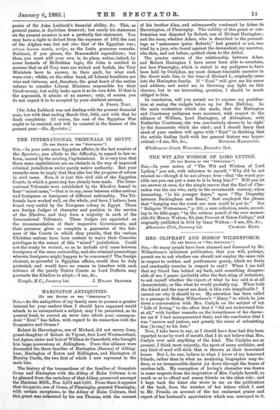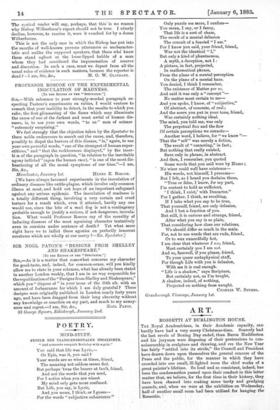MRS. OLIPHANT AND BISHOP WILBERFORCE. LTO THE EDITOR OF "Tin
SPECTATOR."] SIB,--S0 many people have been alarmed and dismayed by Mr. Wilberforce's indiscreet publication, that you will, perhaps, permit me to ask whether one should not employ the same rule in respect to written and posthumous gossip, which we freely and constantly exercise in respect to oral ? When I am told that my friend has, behind my back, said something disagree- able of me, I pause (probably after the first sting of irritation), to ask myself whether the report of what he has said is at all characteristic, or like what he would probably say. When both' the friend and the report are dead, is this rule inapplicable ? I cannot see why it should be so. My attention has been called to a passage in Bishop Wilberforce's "Diary," in which he jots down a conversation with Mrs. Carlyle on the subject of my "Life of Irving," to the effect that I "did not understand him at all," with further remarks on the loveableness of his charac- ter (as if I had misrepresented that), and the conclusion that I was "narrow and jealous, and greatly the cause of submitting him [Irving] to his foes."
Now, I take leave to say, as I should have done had this been reported to me by word of mouth, that I do not believe that Mrs. Carlyle ever said anything of the kind. The Carlyles are at present, I think most unjustly, the sport of every scribbler, and any kind of mud will stick -that is thrown at their desecrated house. But I, for one, believe in what I know of my honoured friends, rather than in what an analysing biographer may de- duce, or an irresponsible diarist jot down through the fames of careless talk. My conception of Irving's character was drawn in some respects from the inspiration of Mrs. Carlyle herself, so much so as to offend and annoy friends on the other side; and I kept back the letter she wrote to me on the publication of the book, from the number of her letters which I sent to Mr. Fronds, on account of the- too exuberant praise and report of her husband's approbation which was conveyed in it.
The cynical reader will say, perhaps, that this is no reason why Bishop Wilberforoe's report should not be true. I utterly decline, however, to receive it, were it vouched for by a dozen Wilberforces.
This is not the only case in which the Bishop has put into the mouths of well-known persons utterances so uncharacter- istic and unlike the supposed speakers, that those whd know them stand aghast at the loose-lipped babble of a man whom they had considered the impersonation of reserve and discretion. In such a case, must we depart from all the usual rules of evidence in such matters, because the reporter is















































 Previous page
Previous page